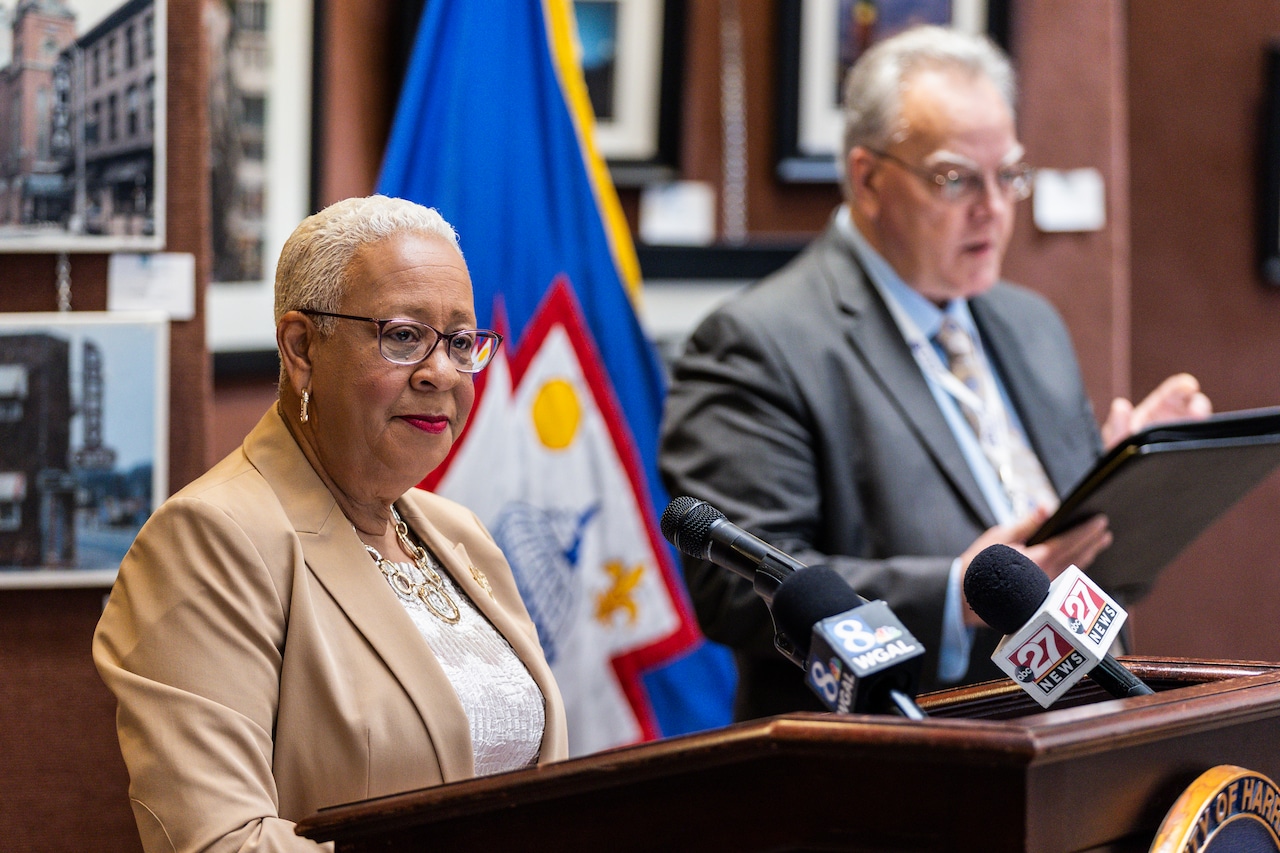
Harrisburg Mayor Wanda Williams announced 13 recipients that will receive nearly $8 million for affordable housing projects in the city using federal American Rescue Plan Act (ARPA) money.
The largest single grant, $1.3 million, went to a project led by former NFL player LeSean “Shady” McCoy. His Savoy 48 development will include 48 units, but only 10 of them will be designated as affordable housing.
Williams announced the recipients during an 11 a.m. Wednesday press conference, beginning her remarks by touting transparency and accountability in her administration. She also criticized questions raised by council members and PennLive about the process she used to distribute the money, which involved her selecting two people who had no known expertise in affordable housing projects.
Experts told PennLive the private and fast selection process didn’t match best practices for spending public money, and it’s not how many other municipalities handled their ARPA funds.
On Wednesday, when reporters asked how the city decided who received funding and how much, officials struggled to give a clear answer.
“It’s hard to answer that question without going specifically detail through each particular project and see what’s the total project, what’s the total cost, how much of a match…,” said Sam Sulkosky, the mayor’s business administrator. “So that’s a very difficult question to answer.”
According to the city’s scoring rubric, one of the most important factors in determining who received funding was a developer’s track record of building affordable housing in Harrisburg.
It’s unclear, however, whether that referred to completed projects or ongoing ones, as some awardees have yet to finish one. The city did not provide the results of the scoring when requested by PennLive.
Former NFL player LeSean McCoy, who owns Vice Capital, developed JMB Gardens, a 41-unit affordable housing complex that opened earlier this year. The project received more than $1.3 million in state and city tax credits.
The “Savoy 48,” project that received the new funding isn’t a fresh proposal. The project’s contractor told The Burg in 2023 it was already slated for completion in fall 2024.
The other receipients
Latino Connection Foundation LLC, led by George Fernandez, received $1.5 million through two grants to build 71 units.
Those projects were the only ones listed on Fernandez’ website. Even though Sycamore Homes is not yet complete and had just won funding, Mayor Williams cited it as a success story during her press conference.
Fernandez and his family members have donated a total of $10,000 to Williams’ campaign this year alone.
TLC Capstone & TLC Cornerstone Revival, led by Tarik Casteel, had two projects that received a combined $1.35 million for 84 units. Casteel has also previously donated to Mayor Williams’ campaign.
Government experts said Pennsylvania doesn’t have a pay-to-play law, like some states in including Illinois and New Jersey, that restrict campaign contributions from people or organizations trying to receive financial rewards or contracts.
Craig Holman, a government ethics expert with Public Citizen, said the donations while legal, can raise questions about fairness.
Handles Helping Hand Foundation, run by Harlem Globetrotter Chris “Handles” Franklin, received $900,000 for four units. The only affordable housing project Franklin has overseen in Harrisburg is set to start construction in 2027.
Breneman Group, led by Adam Breneman, received $650,000 for 14 units. No affordable housing projects are listed on the company’s website. The Burg reported in Aug. 2025 that the group had proposed converting three office buildings into a 10-unit apartment complex.
Other recipients: Beahive Affordable Housing Outreach and Habitat for Humanity, where former city building and housing director Dennise Hill serves on both boards, received a total of $800,000 for eight units.
PSV Properties LLC, Scholars Inc., Wildheart International Ministries Gateway, and Williams and Williams Properties LLC each received under $500,000.
Wynton Williams who has worked in real estate since 2016, said the city’s short application window limited how many developers applied and that was by design.
“Because if you allow two, three months, you’ll have well over 100 applications and you’ll spend the next six months trying to make a decision on something,” he said.
Wynton is part of Williams and Williams Properties LLC (which Sulkosky joked were not related to the mayor but he wasn’t “sure if we got a DNA test”).
Sulkosky said the city didn’t expect to get the 26 applications that they did for this process.
“So obviously, the 21 days is more than sufficient for people to respond,” Sulkosky said.
The timeline provided developers with 18 business days to submit their applications.
A total of $7.75 million was awarded at the press conference out of the $8 million available. Sulkosky said the remaining $250,000 was tied to the struggling Governor’s Square project and would serve as a contingency fund in case developers needed additional support. When asked if the city would publicly disclose when or how that money is spent, Sulkosky replied, “I have no idea.”
The money for the grants announced Wednesday had been sitting unused for more than two years before the speedy process to distribute the funds, which comes less than four weeks before the mayoral election.
Sulkosky said the awards were delayed because of understaffing in the mayor’s office for “four to five months last year.”
When PennLive noted that the delay lasted more than two years, Sulkosky replied: “You’re reading too much into the two-year thing. We did other programs during that time.”
The long wait came with a cost. As inflation rose, the purchasing power of the $8 million fell by about half a million dollars.
“This is a common issue with government spending, but 27 months is an unusually long time to wait to use already appropriated money,” said Indrit Hoxha, an economics professor at Penn State University.
Despite the two-year delay, the process itself moved quickly once it began, from the public announcement of the funds to notifying awardees in less than two months.